The period March to May 1998 was an interesting time in Indonesian history. This journal reflects some of the things that happened in my life over this period. Some of it is perhaps rather too personal, but that was the nature of my encounter with Indonesian culture over that time. It is by no means comprehensive; a great many important events – both personal and public – I chose not to write about. Some names have been changed to protect peoples privacy. Like most journals, it starts strangely and ends abruptly.
12 Mar 98
I called Yuni tonight. My lack of a religion is causing her great problems. For some reason she doesn’t want to talk to anyone else about this problem, which is to say, the problem of my religion, or more precisely, my lack of one. This is Indonesia, after all. Not having a religion means you’re a communist. Simple really.
13 Mar 98
Yuni phoned three times today. She says she has been praying for an answer to her dilemma. She finally phoned me to arrange a time to meet in Yogya town, and there she told me that she wants to go ahead with our marriage, once I have been to see the imam at the local mosque. After that, she wants me to meet with her parents again. She seemed very relieved to have made a decision.
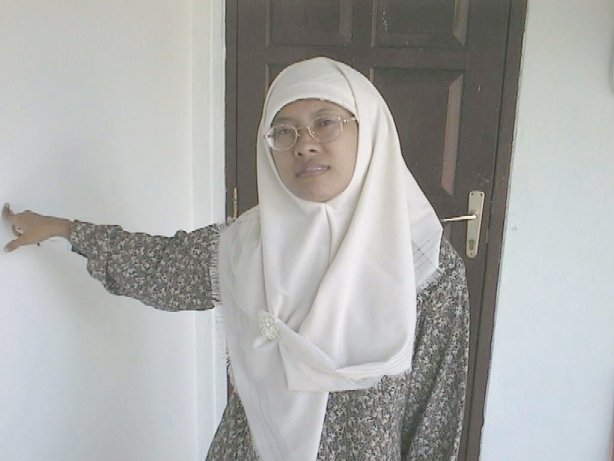
14 Mar 98
Went out with Yuni today to visit the pottery kampung of Kasongan, just a few miles south from my house in Wirobrajan. We visited many shops there to see if any of the pottery there was marketable for export. At lunch, Yuni started explaining what will be expected of me when I formally propose to her parents, and the types of gifts I should bring and the kind of language I should use. She also recounted amusing stories about Sundanese marriage proposal traditions, reflecting the relative aggressiveness and materialism of the Sundanese.
15 Mar 98
Received news of Soeharto’s new cabinet today. It includes Soeharto’s old mate, Bob Hasan as Trade and Industry Minister (like putting Dracula in charge of the blood bank), and Soeharto’s eldest daughter, Mbak Tutut as Minister for Social Affairs. I am hoping for a negative reaction on forex markets so I can afford to buy a car. Indonesian’s seem completely resigned to Soeharto’s arrogance; the attitude is “well, what do you expect?”
17 Mar 98
I became a fully paid-up, card-carrying Muslim tonight. Yuni and I went downtown to the mosque on Jalan Mataram. Yuni picked that one for me because Amien Rais sometimes goes there. The pengurus mesjid (“Mosque keeper”) took us into his office where he questioned me about my intentions to become a Muslim, with an express emphasis on what my parents and relatives would think about this. Obviously, for the average Indonesian, conversion is a much more serious business with significant negative social and family implications. After giving him all my information (name, dob, address, etc) and filling in all the ubiquitous forms, the pengurus mesjid took me through the confession of faith, first in Indonesian (easy), then in Arabic (not easy). I had to memorise the Arabic version so that I could recite it in front of people coming into the mosque straight after the ’isha prayers, which I later did. There were about 40 people there.
asyhadu alla ilaa ha illallah, wa asyhadu anna muhammadar rasuulullah. [Saya mengakui, bahwa tidak ada tuhan melainkan Allah dan saya mengakui, bahwa Nabi Muhammad itu utusan Allah.]
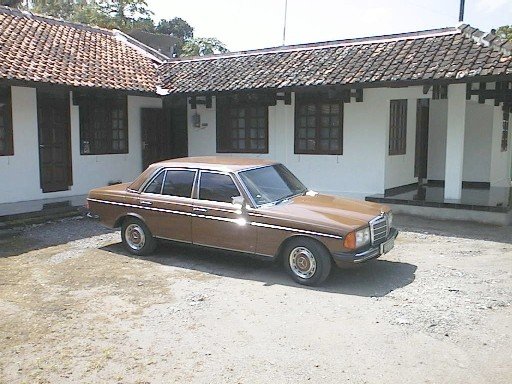
Some were not satisfied with my Arabic rendering of the confession of faith, so I had to repeat it a total of four times. After some more prayers, the ceremony was over. Most of the people there stayed on to talk to me, or just to listen to what I was saying to other people. The pengurus mesjid wanted me to go to the mosque at fajr (dawn, at 4:45am!) tomorrow for solat subuh (dawn prayers), but unfortunately it seems that I have another appointment at that time.
29 Mar 98
Jarwanto and Hasan came around this morning to start lessons on how to solat (Islamic ritual prayer). We first went through the steps of wudhu, ritual bathing before solat, and explained at length on the symbolic meaning of each step, and the Arabic phrases which need to be said at the beginning and end of wudhu (Bismillahir rahmanir rahim and Alhamdulillah respectively).
After a wudhu practice session, we then proceeded to talk about solat; the movements, and the words, which need to be said at each point. I am having a lot of difficulty memorising the long Arabic prayers, so they have given me the “baby version” so all I need to recall is “Allohu akbar”, and “Sami Allohu liman hamidah”, and “Assalamwalaikum warahmatullaahi”.
The movements for solat are not as easy as they appear, especially at the “sitting” stage (duduk Tasyahud), when the feet need to be arranged in a certain manner. Basically, my body refuses to do it.
Jarwanto and Hasan have offered to come over for a few hours every Sunday until I think I have mastered solat.
I consider it important that I at least know the technicalities of solat to make myself more socially acceptable/accessable to my in-laws.
5 Apr 98
There have been many student demonstrations recently, especially, of course, here in Yogyakarta. The demos are always confined to the campuses and generally involve a few thousand students, many of whom masquerade as innocent bystanders. Hundreds of riot police accompany every demo. By far the biggest demo was at UGM (Universitas Gadjah Mada) on the day of Soeharto’s acceptance speech a few weeks ago; more than 50,000 students “according to police estimates”. Amein Rais spoke at this gathering.
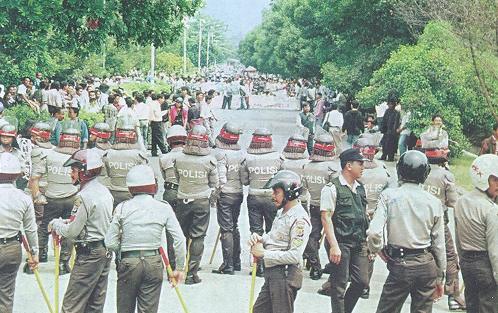
At every demo there is usually a symbolic attempt to turun ke jalan, which means leaving the confines of the particular university and taking to the streets. The Government and ABRI (the Indonesian Armed Forces) seem quite happy to confine this activity to the campuses. There has been good — and as far as I can tell, accurate — reporting of all these demos, however details of casualties are usually not mentioned.
Frankly, the demos are insipid affairs organised by young, totally inexperienced naives. At many of the demos a demand for a “dialogue” with the President has been made. Ridiculous really. No program, no objective, no idea. I hope I’m wrong, but I think they’ll fizzle out soon and get back into training to become the Golkar leaders of the future.
This is an extract from an email message from a Sastra (English Dept) student in Yogya to another student friend in Irian Jaya:
To be honest right now the situation is quite desperating, as if you could imagine the 65’s situation. There is no more army as the people server what exist now are they behave in the way Dutch do to the students … absolutely brutal … imagine, they broke about 50 motorcycles belonging to students, and kick, stick and beat as well to any body surrounding the demonstration. Though, i can’t join the demo due to my own private business, i feel very concerned and sympathetic to the students.
6 Apr 98
I bought a goat for Sacrifice Day (Hari Qurban) tomorrow. Yuni and I went down to a goat seller’s yard, and selected our sacrifice. I displayed my prowess as a former goat breeder by speaking “goat” to the seller. He seemed to be impressed, but he still charged me a fortune for a rather pathetic, scrawny he-goat (Rp175.000). All the goats on offer were male, and all were “whole” (uncastrated) which I found rather odd until I recalled from memory a certain hadith (a formal Islamic tradition) forbidding the castration of both man or beast.
However, thinking more about this, there seems exist a contradiction in relation to this matter. Western Australia exports tens of thousands of live sheep to Saudi and other Arabian countries every year, and all of them are wethers! (ie, castrated males). Why this inconsistency? Odd. Perhaps the hadith in question written by one of the less ‘credible’ authors, recognised in heterodox Indonesia, but not in orthodox Arabia? Just a speculation. Certainly the Koran is fairly clear on human castration, but there is no direct mention of animal castration to my knowledge.
My goat has been taken to Yuni’s parent’s house, and will be taken to the mosque tomorrow to be slaughtered and butchered. I will take a hindquarter and the rest will be divided by the mosque committee amongst the Muslim poor of the area.
7 Apr 98
I went to the alun-alun utara (a large square near the palace of the Sultan) early this morning for the commemoration of Hari Qurban. Although the alun-alun was not as packed as last year, I estimate that there was still at least 100,000 people present this time around. Apparently last year was bigger because Hari Qurban fell after a Ramadan Besar (“Important Fasting Month”), and this year is merely a Ramadan Kecil (“Lesser Fasting Month”). Me and my friends from the local mosque got a place close to the podium where the speeches take place. After solat, the imam gave a lecture on the virtues of the spiritual path as opposed to materialism, and pointedly used the ‘good’ example of the President to ‘illustrate’ his point.
I went to Yuni’s place to night for dinner. Yuni and her mother prepared gulai kambing (goat curry) with my portion of the goat.
9 Apr 98
I went to report to Polres Yogya today. A lot of police about, both in the building, and in also trucks surrounding Polres. Hundreds of riot shields, batons and helmets were arranged in rows on the ground. I heard later from Kerkan that a big demo is in progress at UGM, perhaps more than 50,000 people, and that they have already left the university grounds. The police are apparently taking little action, perhaps concerned about the large size of the demo and any reaction to their interference. Emotions are running very high at UGM and other universities because of the large number of students in detention at Polda (Police Provincial HQ), and also because of 14 students who are alleged to have been abducted by ABRI.
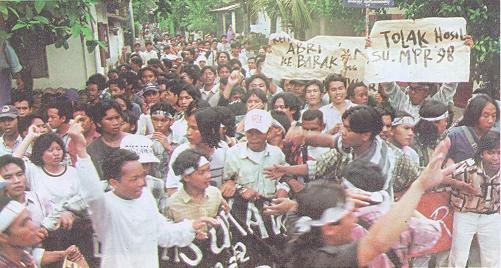
This afternoon I had a visit from someone from Polres. They are apparently concerned that the owner of this house had not reported the presence of a foreigner (ie, me). However, I think perhaps they are jittery about the demo today. Or perhaps they are just hungry; many police have been deprived of their usual bribe income because they have been compelled to attend student demonstrations. They managed to get Rp10,000 out of me, for some rather ambiguous reason.
Went over to Yuni’s house this evening to meet with her father. I asked him to give his blessing to my marrying Yuni. He seemed stuck for words. (Situation made worse by the fact that his Bahasa Indonesia is rather poor.) Yuni’s mother joined us and seemed to take over the course of the discussion, which is not really the done thing, but her Indonesian is a bit better. Basically, Yuni’s parents have agreed to our marriage, but the timing remains fuzzy, complicated by the fact that one of Yuni’s younger sisters married a few months ago, and another of her younger sisters will marry in June. It has been suggested that we marry immediately but delay the celebration party until seven Javanese months after Yuni’s sister’s marriage. I will need to clarify this matter later.
17 Apr 98
A few days ago I discovered that I have in fact not proposed at all. What I have done is to make a proposal to make a proposal. Tonight the formal lamaran (“proposal”) ceremony took place at Yuni’s parents house. In the absence of my parents, who by right are supposed to do the “negotiating”, I managed to enlist the services of “DR” as my wakil (“representative”). This concept of the wakil seems quite widely accepted; Yuni’s father was in fact represented by his brother-in-law (Yuni’s uncle) at the lamaran, presumably because he is a better speaker and also because Yuni’s father is rather shy. My emailed request to DR to be my wakil had to be couched in careful terms:
I am confronted with a small problem at the moment, and I am hoping you just might be able to advise me. As I already mentioned, Yuni and I intend to marry soon. To this end I met with her father last week to ask for his blessing and permission. This I received, in a kind of way, but it seems my presentation left a lot to be desired. Just to fill in the picture a bit, Yuni lives with her mother, a devout traditionalist Muslim, her two married sisters, both more of the modernist stream, her cousin, who is a strong follower of the Sumarah movement, and Yuni’s dad, who is also a Sumarahan. Yuni herself is a modernist Muslim. Very briefly, Yuni’s dad — who, btw, is a very nice man — is having problems giving an unequivocal “yes” (if such a thing exists in Java) to our marriage plans firstly because I am a foreigner, but more seriously because I am not a person; I am an island without connections; a mere free-floating particle. Although I am already 40 years old (sigh) it seems he feels very uncomfortable “negotiating” directly with me, rather than with my parents! Worse, his Indonesian is sometimes very hard for me to understand, and he often mixes in Javanese. Now, Yuni has mentioned the possibility of getting someone to represent me at the lamaran (the giving of the gifts for Yuni and money for the party). So, I am looking for a person who is older than me, European, who can speak Kromo, and who is highly respected in society. (actually, I would settle for 3 out of 4 …) My question is this: would you happen to know of a certain person in Yogya who fits some or all of these criteria, and who would be prepared to accompany me some evening this week in order to assist in “representing” me? If you have any thoughts on this I’d truly appreciate hearing them. Salam.
Fortunately, DR accepted this task. Here is my reply to his emailed acceptance:
Hello DR Thanks very much for your offer of assistance. I truly appreciate it. […] > How about Wed or Thurs night ? Sounds good. Yuni sent a message up the family hierarchy this morning; the reply came back that Thursday evening at 7pm would be a good time to come. I hope this is convenient for you; if it is not for any reason let me know and I’ll postpone it. I shall be bringing some other people with me, including a few business colleagues. I shall be borrowing a car from one of my associates so that we might all go there bersama, and also as an insurance against jam karet. >By the way I have a few phrases of kromo but can’t speak it. That’s ok. Your eminence will more than make up for this small deficiency. 8-) I may try to get Yuni to call you sometime before the ‘event’ so that you are informed of what is expected of us. The lamaran will in all probability be offered and discussed without her actually being present (weird, isn’t it?). All that is really required is an introduction, and some general talk. It is simply to reassure Yuni’s father that I’m am indeed an Earthling, and that I have ‘links’ within the Yogyakarta community. Basically, you will be my father substitute (god, this is embarrassing), and my business colleagues will be my saudara. All very symbolic of course. So, I &/or Yuni will give you a call on Thursday to confirm/remind/advise, and all going well, I shall pick you up at about 6:30pm. Once again, thanks very much for your help! Salam, and hope you are feeling better.
During the afternoon before the lamaran ceremony, Yuni and I had to go shopping for the bingkisan; a collection of gifts for the bride-to-be which need to be displayed at the lamaran ceremony. Now, it seems that it is “traditional” for the calon isteri (“wife-to-be”) to accompany her calon suami (“husband-to-be”) on this particular shopping excursion, which begs the question, what happens if the proposal is later refused? There are two answers: firstly, it is unlikely that the proposal will be refused at this point, as the proposal-to-make-a-proposal has already been accepted; secondly, there is a local tradition which says that the value of the bingkisan must be returned two-fold if the proposal is refused at the lamaran. So the lamaran is a ceremonial confirmation of something which, by and large, has already been agreed to.
The bingkisan consisted of the following:
a length of batik silk a pair of shoes cloth to make a high quality kebaya a pair of new glasses a handbag a kerudung a pack of kiwifruit a prayer mat a good quality koran a prayer dress a fluffy towel
I had mistakenly assumed that to get all this would take no more than 4-5 hours. Ten hours later we had still not finished. After wrapping the gifts at my house, Yuni went home to help prepare the selamatan (ceremonial meal).
Later, on arrival at the Yuni’s parents house we — that is, my small contingent — were welcomed by Yuni’s father, his wakil, and some other important people, all male of course. The bingkisan were placed on the tables in the middle of the guest room for all to see. About 30 men were present at this event; neighbours, relatives, and friends of Yuni’s father. After all seated themselves, Yuni’s father’s wakil gave a welcoming speech, outlining the purpose of the event, and telling everyone the sequence of speakers. At some point DR was given the direction to speak on my behalf. (I was given almost no opportunity to speak myself; this is apparently normal.) All those present seemed extremely impressed with DR, and with what DR said about me; fortunately he had the excellent idea of memorising my CV (with only a modest amount of gloss), so could field any questions on my behalf.
After the acceptance of my proposal by Yuni’s uncle, a meal was served, and Yuni appeared in the room for the first time. Yuni’s uncle pretended to “introduce” us as if we had never met, to much laughter. Our relationship has been the talk of the neighbourhood for at least 6 months, and rarely a day goes by when we are apart, with the exception of 3 weeks I spent in Australia last February.
After the meal was completed, the lamaran was officially declared finished. More informal discussion took place, and the guests started to drift out.
19 Apr 98
Normally the date for the wedding is set at the lamaran, however, because of problems with multiple weddings in Yuni’s family and a few other factors such as getting a ‘permission’ letter from the Australian embassy, this was not therefore discussed. Further, it appears that it may take some time to organise the necessary documents for the marriage ceremony. Tonight Yuni and I discussed with her dad the possibility of a nikah sirrih (sp?), which is a religious marriage without the presence of the official pencatat (“registar”) from Kantor Urusan Agama (Office of Religious Affairs). This practice is apparently quite common, and apparently also quite disliked by the government. Yuni’s father agreed to this arrangement and set the date for the next Friday night.
Student demonstrations are continuing around the city, at the moment taking the form of ritual confrontation with ABRI troops who prevent the students taking to the streets (“turun ke jalan”). The demos usually consist of a core of students up to several hundred in number, surrounded by a significantly higher number of students and a few dosen (“lecturers”) together masquerading as “innocent bystanders”. The core group, consisting largely of testosterone-charged male teenagers wearing headbands and smoking cigarettes, conduct the theatrics for the benefit of the innocent bystanders, the troops and passing traffic, periodically strutting purposely from the core to the ring of ‘bystanders’ for obviously important reasons.
April 98
There is a Dengue Fever epidemic in Indonesia at the moment; I have speculated that the reason for this could be a general sense of malaise amongst the population and a concurrent decline in the ‘community spirit’ required to undertake the activities needed to keep mosquito’s under control. Since the ‘re-election’ of President Soeharto and the subsequent plummeting in the value of the Rupiah, I have noticed that people in my neighbourhood have stopped caring about little things like keeping yards weed-free, and clearing away rubbish. This is in stark contrast to the same time last year. Things are grim.
24 Apr 98
Wedding ceremony at 7pm last night. The set-up was much the same as the lamaran, with about 30 men seated in the front room of the house, but this time there was an additional person present, a Haji who was there to supervise the nikah sirrih ceremony. I was accompanied by a friend, Kerkan, and some business associates.
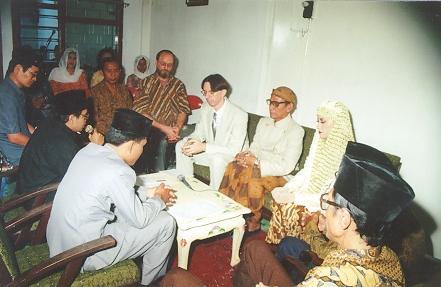
Unfortunately DR could not make it that night, having to accompany a number of very sick students to Jakarta. After the obligatory introduction speeches announcing the purpose of the ceremony, the Haji began.
Haji: Bismillahir rahmanir rahim. [“In the name of God, the Merciful, the Compassionate.”]
He then instructed me to place the maskawin (“bride-price”) on the table. The maskawin in this case comprised a set of solat things (prayer mat, Koran, etc) and Rp1.000.000,- (a bargain!). At this point Yuni entered the room and sat down in a chair near her father. The Haji then instructed Yuni’s father and I to shake hands whilst saying the following:
Yuni’s Father: Ananda ‘Gary Dean’. [“You, Gary Dean.”] Me: Saya. [“That is I.”] Yuni’s Father:* Saya nikahkah anak saya ‘Yuni Dwi Astuti’ dengan maskawin seperangkat alat solat dan uang sejumlah satu juta Rupiah di depan ini. [“I marry my daughter Yuni Dwi Astuti to you with a brideprice consisting of a set of prayer items and one million Rupiah cash, which is in front of us here.”] Me: Saya terima nikahnya ‘Yuni Dwi Astuti’ putri Bapak kepada saya ‘Gary Dean’ dengan maskawin seperangkat alat solat dan uang sejumlah satu juat Rupiah di depan ini. [“I accept the marriage of your daughter Yuni Dwi Astuti to me, Gary Robert Dean, with a brideprice consisting of a set of prayer items and one million Rupiah cash, which is in front of us here.”] Haji: Wallahu a’lamu bish-shawab; Billahi at-Taufiq wal hidayah*. [“!?”]
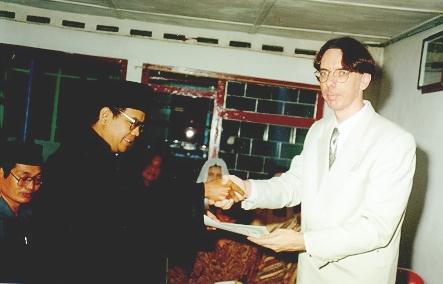
Thus ended the formal part of the ceremony. Once again a few speeches were given, and we all ate a meal prepared by the women before and during the ceremony.
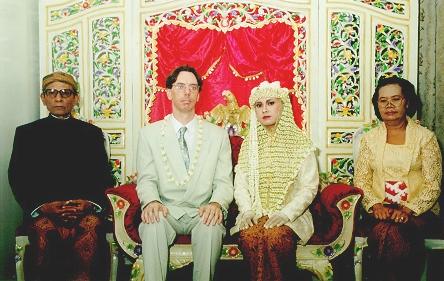
There were many women present at the house, but they all congregated at the back of the house. The food was actually served by male family relatives. After the meal was finished some of the women came out to talk and to give their congratulations, and the selamatan gradually dissolved. I stayed back with Yuni until all the guests had left, and then had to formally ask Yuni’s fathers’ permission to take her home with me, which of course he gave.
Later I saw Yuni for the first time without her jilbab (head-covering). She was very embarrassed to remove it, and strangely, I was sort of embarrassed to see her without it, which was an unexpected reaction. Happily, the only surprises were pleasant ones, alhamdulillah.
4 May 98
The price of petrol will nearly double from 12:00 tonight. Consequently, the roads are absolutely clogged with cars queuing for the last of the cheap petrol, on the northern ring road I estimate one ‘queue’ (or a traffic jam the result of a queue) to be about 5km long.
The university demonstrations around Yogya are starting to get bloody, and roads near universities are frequently closed or difficult to pass.
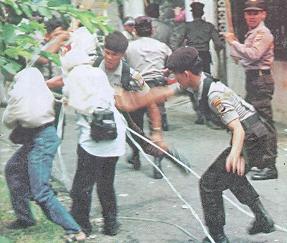
10 May 98

First publicised death of a student occurred yesterday; apparently he was an ‘innocent bystander’ who didn’t, or couldn’t, move away from the troops fast enough. Apparently, he was clubbed to death.
Jalan Gejayan has been completely trashed, with all the street signs, lights and plants destroyed along its entire length of several kilometres. Significantly, the only damage to private property was the Bank Harapan Sentosa (BHS) building, where every one of its considerable number of large windows were broken. BHS went down with 15 other banks in December last year, if I remember rightly.
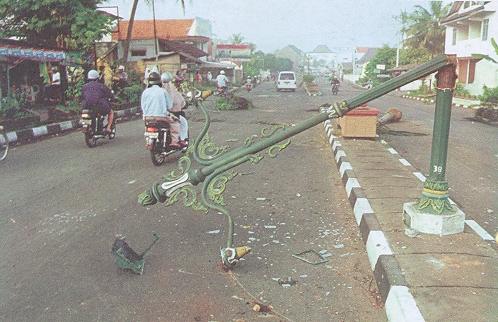
The word ’reformasi’ is starting to appear in the newspaper headlines. The atmosphere on the streets is definitely changing and the newspapers are becoming bolder, as are the radio/TV reports, in particular the Liputan 6 program on SCTV, which is also broadcast on radio and is my only source of electronic news at the moment.
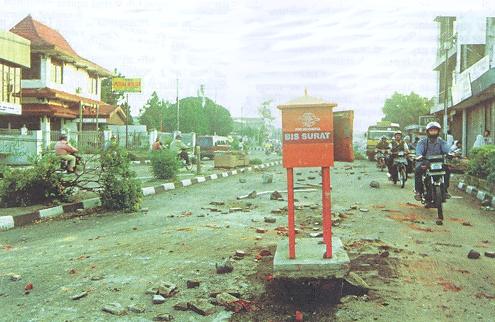
13 May 98
Things are falling apart rapidly. Newspapers report up to six shot dead by ABRI troops at Universitas Trisakti (other reports say four dead.) This could be a trigger; I frequent a certain café in Jalan Malioboro, where I read the newspapers. The owner of the café, a fairly conservative person by all appearances, deliberately came up to me to show me the headlines. Everybody seems to be very affected by this event, and conscious of its potential significance.
Soeharto is currently out of the country, a fact reported by Kompas opposite a page with a large photo of a dying student lying on the road with riot troops in the background. In the same edition there are reports about the Philippines elections, and ‘People Power’.
14 May 98
The shit is hitting the fan. I unintentionally drove into a huge demonstration on Jalan Kaliurang on my way to Pujayo café. All the streets from Fakultas Kehutanan in the north to just past Mirota Kampus supermarket in the south are clogged with students milling about, waiting for something to happen.
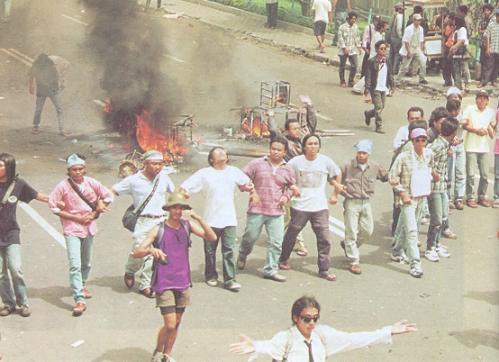
I had to detour around them using the backstreets, but even this was difficult as these streets also were filled with students. When I eventually came back onto the main road, the violence had already started with a large number of armed troops blocking the road just north of Pujayo café.

Rocks littered the road in front of them. All the shops were shut, so I kept going till I got to Malioboro. Only a few shops were open there. Many shops are displaying large signs such as ‘Pro-Reformasi’ (“pro-reform”) and ‘Milik Pribumi’ (“Owned by a Native Indonesian”, a code phrase meaning “non-Chinese”) as insurance against having their property destroyed and/or looted.
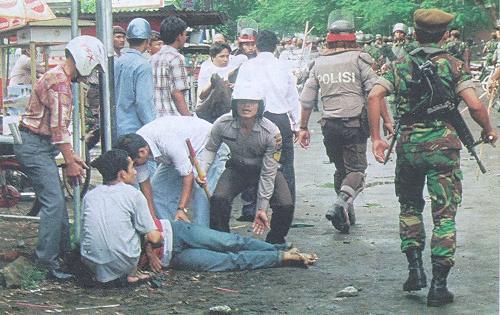
16 May 98
Heard news from different people yesterday that Solo has ‘been destroyed’ [“dihabisin”]. I thought this was an exaggeration till I saw the newspapers today. Indeed, the entire Solo CBD has been destroyed. (Perhaps they forgot to display their pro-reformasi signs?)

Yuni’s cousin, who lives in Solo, told me that a mob also burned down Harmoko’s house in Solo, somehow avoiding damage to near-by houses, this apparently being a testament to the selectivity of this violence. Coincidentally, I have many in-laws in Solo; Yuni’s mother comes from there. Some of them are staying over at Yuni’s parents house.
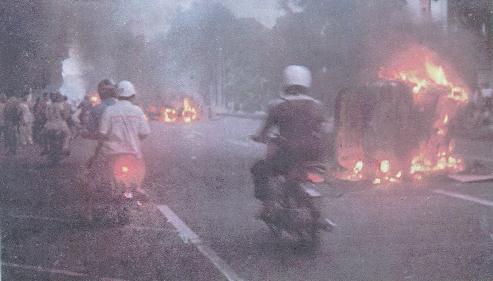
People are flying Indonesian flags at half mast all over the city; all except government offices, which are still at full mast. The Sultan has started to get involved. He addressed a huge demo near my old house in Wirobrajan today (I continue to lease that house although I don’t live there anymore); impossible to know how many people were there, but the roads were clogged for hours.

The ‘pro-reformasi’ signs are everywhere now; obviously no-one wants to be caught like the shopkeepers of Solo. The size and professionalism of these signs varies considerably, but there is an definite correlation between the size of a spanduk (a large cloth advertising banner) and the amount window-space at the front of the building on which it hangs. ‘Milik Pribumi‘ signs are also becoming common, suggesting to would-be looters that it’s quite OK to loot non-Pribumi (read, Chinese) shops. Even the Sultan is doing it; on one of his large buildings on Jalan Solo is a large spanduk reading ‘Gedung ini milik Sultan’ (“This building belongs to the Sultan”).
Cars are sporting ‘pro-reformasi’ signs as additional insurance. This is reminiscent of last years election when virtually every driver carried ribbons supporting all three political parties, although obviously the PDI’s red ribbon was superfluous. Drivers not showing obvious support either with a ribbon or with the appropriate one (PPP) or two finger (Golkar) salute, risked damage both to their car and to their person from the swarms of youth participating in the motor cycle convoys at that time. In Indonesia, the mob rules.
The word has gone out that Wednesday the 20th, Hari Kebangkitan Nasional (“Day of National Resurgence”), shall be ‘The Big One’, and that protests will continue and increase in intensity until Pak Harto’s birthday on the 8th of June, when, according to my impecable sources, blood will flow.
18 May 98
A few variations on the ‘pro-reformasi’ theme are beginning to emerge, such as the uncompromising ‘reformasi total’, through to the reductionist ‘reformasi secara konstitusional’ (“reform in a constitutional manner”), ‘pro-reformasi damai’ (“pro-peaceful-reform”) and ’reformasi tanpa kekerasan’ (“reform without violence”). This last theme is increasingly popular among shopkeepers, and the Sultan also seems to be taking up this slogan. Of course, the truth is that without violence, no change whatsoever will happen in Indonesia.
Heard on the radio that Harmoko — who would have to be counted as one of Soeharto’s more loyal lap-dogs — has asked the president to resign. Perhaps he’s pissed off about his house?
I’ve been stocking up on emergency items “just in case”. Malioboro is very quiet, and I have not seen any Europeans there for some days now. There is a ‘night of the long knives’ feeling about …
20 May 98
Spent nearly all day at home today, though at about 4pm Yuni and I went for a drive through town to Jalan Malioboro. The streets were very quiet, and every single shop and warung were closed. Small motorcycle convoys circled about. There was a very large amount of litter in the streets, in particular Malioboro, obviously testimony to the demonstration there earlier. There was no sign of damage to private property; even the BHS building was untouched. The feeling on the streets is a bit weird and unsettled.

21 May 98
The old man has quit. Habibie has taken office in a manner which is probably unconstitutional, but I doubt anyone cares about that; the main thing is, General (Retired) Haji Muhammad Soeharto has gone. Most shops in Yogya are still shut.
22 May 98

Habibie has a hard task ahead of him. He announced his cabinet to today in a speech televised live. I happened to be in a wartel (telephone shop) with a TV earlier today, and watched the reaction of the wartel employees towards him. They laughed all the way through his speech. He was obviously trying very hard to look like The President, and failing miserably. He adopted his very best Golkar-speak, and looked very earnest and serious. Golkar-speak has now almost disappeared from the radio broadcasts, even from RRI, so hearing it again really rankles, and I’m pretty sure almost all Indonesians generally would feel the same way. “Sorry, but we don’t believe in that garbage anymore.”
23 May 98
There is a feeling of confidence on the streets. It’s as if Indonesians believe that all their problems are now over now that the old man has gone. There is even a little arrogance about. Over the past few days, walking down the streets of Yogya, macho youths have been deliberately forcing me off the footpath; just a little, mind you, but sufficient to demonstrate their new-found power and self-confidence. The tendency of some Indonesians to blame the West for all or part of Indonesia’s problems is by no means new, and perhaps there is a section of Indonesia’s population who see the West as responsible for propping-up the New Order for all these years. Just a speculation. Muhammadiyah youth in particular seem to have some sort of axe to grind with the US all of a sudden, which I cannot yet figure out.
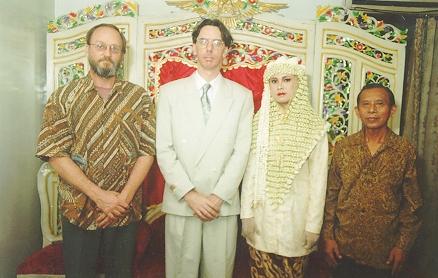
sekian